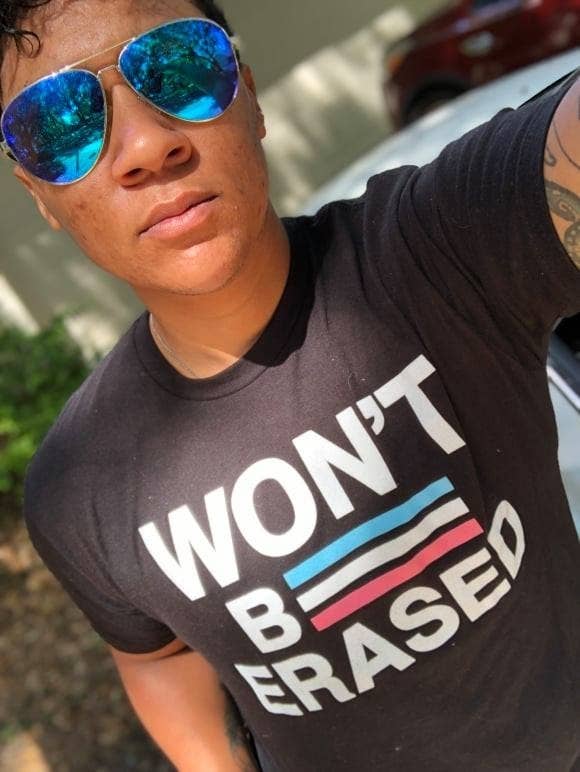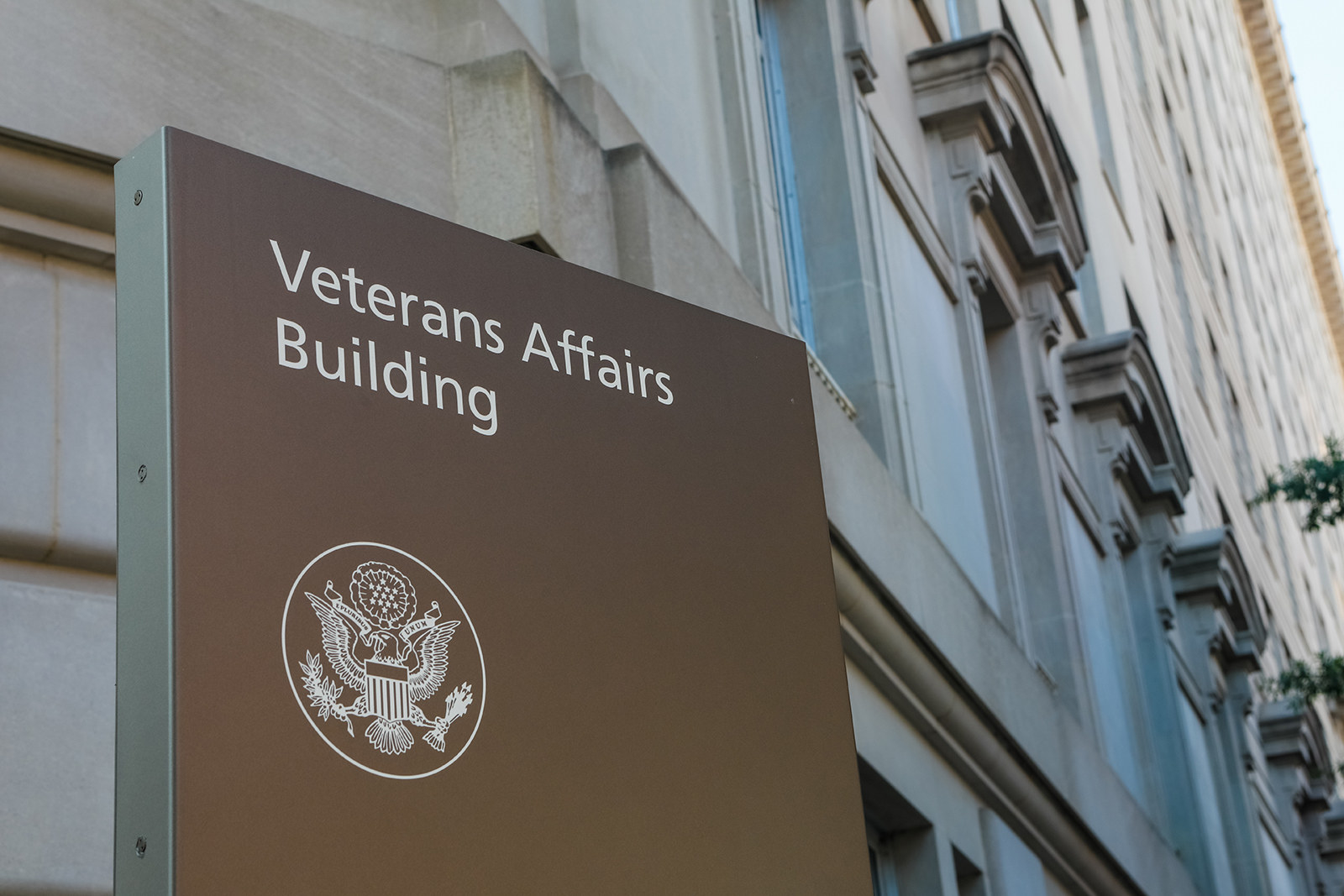
Prior to the announcement last week that the Department of Veterans Affairs would start covering the costs of gender-affirming surgeries, Alix Wells felt trapped in a sort of limbo as he tried to complete his transition.
A disabled veteran who is transgender, Wells had accepted the fact he would need to save about $9,000 for surgeries that would relieve complications caused by hormone replacement therapy, which he started in 2015.
Wells already had one gender-affirming surgery covered by the US government. After over five years of service as an aircraft engine mechanic with the US Air Force and two deployments, Wells had top surgery in 2018 just six months before his exit from active duty. The operation addresses distress caused by gender dysphoria by removing the breast tissue and masculinizing the chest. If Wells had paid out of pocket for the procedure, the top surgery could have cost upwards of $10,000. But because he was on active duty at the time, the government covered the operation.

While Wells has been able to maintain his paid-for hormonal treatments after leaving the Air Force in 2018, he hasn't been able to continue his transition to the extent he would have liked due to lack of medical coverage from the VA. As far as he can get is the endocrinology clinic.
“What was the most daunting, though, is that the VA will not cover any transition-related surgery, even if it is medically necessary,” Wells said to Buzzfeed News, adding that these surgeries have been omitted largely due to a “boggling understanding gap” that he says treated gender-affirming surgeries as discretionary.
“For instance, if I was someone who needed surgery and that involved a hysterectomy, would they provide that to me because it was medically necessary, or deny it because I was in the process of transitioning?” Wells said. “There’s a bit of a gray area there.”
Gender-affirming surgeries are medically necessary sex modifications that the American Journal of Psychiatry has proven reduce anxiety, depression, and suicidality among trans people, but the VA has historically not provided these operations to veterans, stating in a directive that gender-affirming surgeries include a "variety of surgical procedures … done simultaneously or sequentially with the explicit goal of gender transitioning. Not all transgender or intersex individuals want gender-confirming/affirming surgeries."
But that reasoning excludes veterans for whom the surgeries are actually necessary to complete their transition, advocates said.
“I think so many people misunderstand gender-affirmation surgeries as optional. They think that it's something that a trans person can or cannot get,” Avalisa Ellicott, a board member of the Transgender American Veterans Association, told Buzzfeed News. “People think because one person says, ‘I don’t need surgery to be happy,’ that means all of us don't need surgery to be happy. But [the] trans experience is very individualistic. It changes per person. A lot of us do need that surgery for mental health.”
She added: “I think people just don’t understand that affirmation surgeries are not cosmetic. It’s not as controversial as they think it is. I think they think of it in a very flippant way. Because I got a breast job, they feel like I got a breast job just like every other [cisgender] woman who got a breast job, and it was an option that we could have lived our entire lives without.”

Ellicott, who served when “don’t ask, don’t tell” was in effect, said she always expressed herself as more feminine but did not transition until after retiring from the Air Force. She said she would be happier and have more peace with her body today if she had been able to get full bottom surgery, which, for her, would be a procedure that feminizes the genitals, right after she left the military. She had a $7,000 breast augmentation in 2012, which she paid for because it wasn’t covered by her insurance.
“Other than [the breast augmentation], I have not had any other gender affirmation surgeries because the cost is honestly unrealistic for a Black trans woman that is constantly struggling to find work,” Ellicott said.
According to the Philadelphia Center for Transgender Surgery, the surgery, hospital stay, and anesthesia for a patient receiving a vaginoplasty cost an estimated $25,600, not including the cost of postoperative rehabilitation and care. The cost for patients receiving a phalloplasty is about $24,900.
Ellicott said attempts to afford these medically necessary surgeries have pushed some trans veterans to even pay for additional private insurance or crowdsource funds for surgery, which she herself considered for a time. But even so, coverage is not guaranteed; 55% of transgender people who sought any coverage for transition-related surgery were denied, according to a 2015 survey by the National Center for Transgender Equality.
“Previously, it was me and my husband worrying about how we were going to come up with $30,000 and how that fit to our budget and how our lives were going to revolve around this very large sum of money,” Ellicott said. “And now it’s like, OK, the VA is going to pay for it, as they should.”
Wells echoed Ellicott’s sentiment that gender-affirming surgery is not a matter of wanting, but a matter of needing medical attention. Wells has been on hormones since 2015, but as time has passed, he's been in more pain and experienced increased medical complications. Wells said if he could pick any surgery to get done immediately it would be a hysterectomy to alleviate his chronic pain.
“I already, essentially, have given myself the mentality that I wasn't going to get this surgery until I was probably, you know, closer to 40 years old,” said Wells, who is turning 29 in July. “[But] just like anything that is medically necessary that you keep putting off, it just gets worse and worse. The longer I set a hysterectomy off, the higher chances I will end up with major medical issues within the uterus, of developing cysts or even cancer, which can be life-threatening.”
For Wells, the thought of not being able to afford the hysterectomy is “heartbreaking,” and if the operation doesn't happen, it would cause not only continued physical pain but also distress over his inability to be his authentic self.
But change could come as soon as this summer. The VA will soon start to modify its rules to include gender-affirming surgery, but the process of overhauling the system’s care for trans patients could take about two years, an agency spokesperson said.

The next phase for the VA will not be a matter of if gender-affirming surgeries are provided, but how, Paula M. Neira, clinical program director at the Johns Hopkins Center for Transgender Health, told Buzzfeed News. Neira, who is a transgender Navy veteran, did not transition until she had left the military in the late 1990s and paid for her procedures completely out of pocket.
“Whatever the costs are, they’re offset by reduced costs and [not] having to pay for the other issues that arise when people are denied the ability to access gender-affirming care, such as anxiety, depression, suicidality,” Neira said.
She added that the recent change doesn’t mean resources will be taken away from other veterans. According to a report from the Palm Center, the VA estimated in 2016 that the cost of eliminating rules against gender-affirming surgeries would be $7.3 million annually after three years, “which is .0092 percent of VA’s FY2020 $79.1 billion request for discretionary medical funding.”
The level at which the coverage benefit will be used isn’t expected to be extremely high, Neira said, because gender-affirming surgeries aren’t medically necessary for all transgender veterans. The VA spokesperson said an estimated fewer than 4,000 would be interested in the surgery, with the National Center for Transgender Equality estimating that over 134,000 American veterans are transgender.
Wells and Ellicott were both positive about the VA's announcement, but are also left with a lot of questions about how the coverage will roll out.
“It’s kind of up in the air, to see what they're going to write into the new rule,” Ellicott said.
In the meantime, Ellicott and Wells said they will keep a close eye on the VA's website to track new developments.
“As much as I would love to be able to schedule a surgery tomorrow, I am willing to wait as long as it is needed for the VA to properly redesign their policy correctly and, more importantly, as clear as possible so that there are no possible ways that the policy could be left for interpretation,” Wells said. ●
